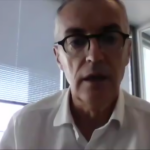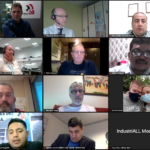1 November, 2021Members of the Saint-Gobain union network continues to promote solidarity and demand social dialogue with the company.
37 participants from 17 countries joined the annual online meeting on 27 and 28 October to discuss demands and goals for Saint-Gobain workers.
The coronavirus represents an important challenge for workers and their families all over the world. Access to vaccination in the Global South remains a problem and unions are pushing hard to solve the issue of fair distribution of vaccines.
Saint-Gobain has fully restarted activities, but the Covid-19 crisis continues to impact how work is organized.
Dominique Bousquenaud, general secretary of IndustriALL French affiliate FCE-CFDT and coordinator of the Saint-Gobain union network, noted that although the company’s financial situation overall is in good shape, a lack of raw materials means some factories have been put on hold.
Saint-Gobain went through a major organisational transformation between 2018-2020, labelled Transform & Grow, to boost synergies, divest less profitable activities, focus management on profitable and potential activities. The company has announced its new strategic plan called Grow & Impact, aimed to accelerate growth and to minimize the group’s environmental impact. Saint-Gobain’s head of social dialogue, Regis Blugeon, joined the meeting, giving delegates the opportunity to express concerns and debate social dialogue at a global level.
Participants noted that social dialogue at the local level needs to be further developed, and that a global context is important, especially when local legislation does not provide good protection for workers.
In Colombia, the company does not recognize the union and all union proposals on health and safety, or temporary work are rejected. Dialogue is possible only within the framework of existing legislation, not sufficiently protecting workers.
In Indonesia, under the disguise of an early retirement program, workers were encouraged to retire and later rehired on lower pay and worse conditions through outsourcing schemes. Young workers are not given sufficient training and risk their health. The employer successfully uses the Omnibus law, allowing exploitation of workers.
Precarious conditions, including lower salaries and worse health protection, demotivate workers in India.
In Germany, the glass plant in Manheim with 150,000 employees, was moved to Poland, where there is to date no workers’ representation. Many Glassolutions factories have been sold to to other companies in the last 18 months. The Saint-Gobain Sekurit division, supplying glass to the automotive industry, faces problems as less cars are produced due to a shortage of raw materials and semiconductors.
Given the obsolete equipment and lack of clarity on the future investment plans, workers in Spain and Belgium are concerned for the future of their jobs.
Alexander Ivanou, IndustriALL materials industries officer, says:
“This meeting was opportunity to get a clear picture of different problems faced by Saint-Gobain workers worldwide and express our solidarity. Delegates’ reports show the necessity of global social dialogue, a proven tool for helping and solving issues and conflicts. We once again invite the company to genuinely engage in social dialogue.”






